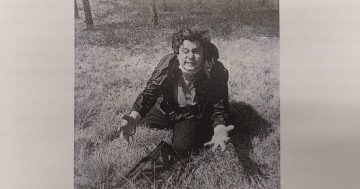
A man has won $5.6 million in a case over unsafe work conditions. Photo: Michelle Kroll.
A former employee of a Canberra furniture store has been awarded millions of dollars after unsafe working conditions resulted in a 100 kg dining table falling onto his head.
The ACT Supreme Court case ended with the employee awarded $5.6 million in damages due to the “catastrophic effects” the injury had on his life, Acting Justice Robert Crowe SC said.
The 35-year-old sued Steinhoff Asia Pacific Limited, trading as Freedom Furniture, claiming damages over negligence by his employer.
Acting Justice Crowe’s judgment states several years ago the man was working at the Freedom Furniture warehouse in Fyshwick and complained to his employer that “there was too much stock in the warehouse and that someone would hurt themselves”.
On 26 September 2016 he had to move a 120 kg sofa. He slid a trolley underneath the box it was in and pulled back on the trolley so that it could take the weight.
When he did so, the sofa knocked into a 100 kg flat-packed wooden dining table standing upright nearby, which fell and hit him on the right side of his head and body.
When he tried to stop the sofa from falling, he felt pain in his lower back and ended up on the floor with the table on top of him until a colleague lifted it off him.
His supervisor told him to lie on the floor in the office before calling his partner, who drove him to the Canberra Hospital.
Acting Justice Crowe said “the cluttered nature of the aisles” in the warehouse meant the man was working in “unsafe” conditions.
“It should have been obvious to the defendant that storing large, heavy objects upright in the aisles created the risk that such an item might fall while workers were trying to move stock through the aisle,” he said.
Medical professionals and a psychologist testified that the man still experienced pain in his head, back and neck, with the pain ranging from “weak” to “almost the strongest imaginable sensation of any kind”, and that he also had depression and anxiety.
“His current levels of depression and anxiety cannot have existed prior to his 2016 work injury, as he would have been hospitalised in the past under psychiatric care,” they said.
After the incident, the employee made a workers compensation claim for which he was appointed a case manager who began attending his GP appointments.
During an appointment he claimed the case manager had suggested the pain was “entirely in his head”, which made him very upset.
In 2017 he was told his workers compensation claim would be closed because a doctor who assessed him for what he said was up to 10 minutes thought he no longer had any physical restrictions, so he would have to pay for further treatment himself.
He began talking to his partner about thoughts of suicide, began to attempt self-harm at an increasing rate, and his mental state deteriorated until he was having frequent stays at the adult mental health unit. He attempted suicide a number of times.
In late 2017 he resigned from Freedom Furniture and began going to Canberra private mental health facility Hyson Green.
The man was prescribed a large number of strong medications for pain and his psychiatric disorder, and said while his back pain was variable, when it was bad, it could cause him to “shut down” and start thinking about suicide.
He became socially avoidant due to anxiety, was not able to do as much work around his house and could not do his hobbies such as fishing or four-wheel driving.
After the incident, his partner said he was not the “happy go lucky” man he used to be and that she now saw herself as his carer.
Acting Justice Crowe said the man’s chances of recovery to his preinjury level of functioning were very low and he was likely to require ongoing medical treatment, intermittent hospitalisation and medications for the rest of his life.
He awarded the man $5.6 million in compensation, including $1.9 million for future care, $600,000 for future lost wages and $350,000 for general damages.



















